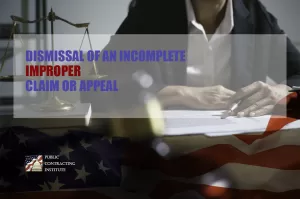A recent Armed Services Board of Contract Appeals (“ASBCA”) decision is a strong reminder that contractors must submit complete and proper claims, or they will be dismissed by either the Contracting Officer or a board or court, if appealed to one of those forums. Andrews Contracting Services, LLC, ASBCA No. 60808 (May 22, 2017).
Andrews submitted to the Contracting Officer a “Request for Equitable Adjustment” for $292,797.51 in connection with its contract. The REA contained a certification required by the Defense Federal Acquisition Regulation Supplement (“DFARS”) 252.243-7702 where the contractor’s President certified that “the request is made in good faith and that the supporting data are accurate and complete to the best of my knowledge and belief.” The Contracting Officer denied the REA three months later, and stated that if Andrews wished to continue this request for equitable adjustment, do so in accordance with contract clause 52.233-1, Disputes. Two weeks after the denial, Andrews filed an appeal with the Armed Services Board.
The board noted that the Contract Disputes Act (“CDA”) provides that each claim relating to a contract shall be submitted to the contracting officer for a decision, and the linchpin of the Board’s jurisdiction is the contractor’s submission of a proper claim to the CO for a decision. In order for the Board to have jurisdiction under the CDA, the contractor must submit a proper claim, an element of which is a request for a contracting officer’s final decision. See M. Maropakis Carpentry, Inc. v. United States, 609 F.3d 1323, 1328 (Fed. Cir. 2010).
The Board looked at all of the correspondence in the case, and concluded that the REA was not a proper claim. It did not explicitly or implicitly request a final CO decision, and Andrews acknowledged that during the litigation. Because the REA failed to request a CO final decision, and was not a proper CDA claim, the Board possessed no jurisdiction to consider an appeal from its denial. The appeal was dismissed for lack of jurisdiction.
The takeaway: It is essential that before a contractor submit a claim, (or seek to convert an REA to a proper claim) that it meet the eight statutory requirements of a proper Contract Disputes Act Claim (See 41 U.S.C. § 7103). The claim must:
- Be in writing
- Request a final decision from the Contracting Officer
- Seek payment as a matter of right
- Seek a sum certain (exact amount)
- Be made with specificity
- Be submitted to the Contracting Officer
- Be non-routine (in dispute), i.e. not be a routine invoice, voucher or routine request for payment
- Be certified if over $100,000
If a contractor submits a Request for Equitable Adjustment in any form, and decides to “convert” it to a CDA claim, the contractor must ensure that it meets all eight requirements, or supplement the REA so that it does meet all eight requirements. Andrews could have retyped or supplemented its REA after receiving the initial CO denial, and resubmitted it in a proper fashion to the CO, and the Board would have had jurisdiction to consider the appeal of any denial of the claim.




